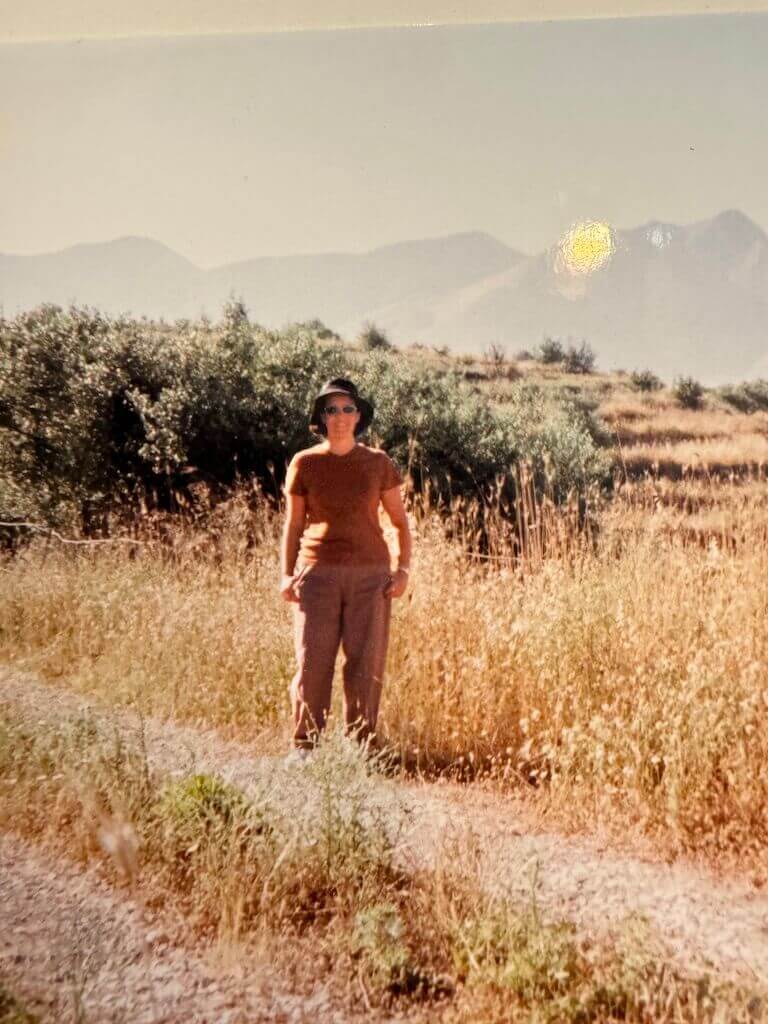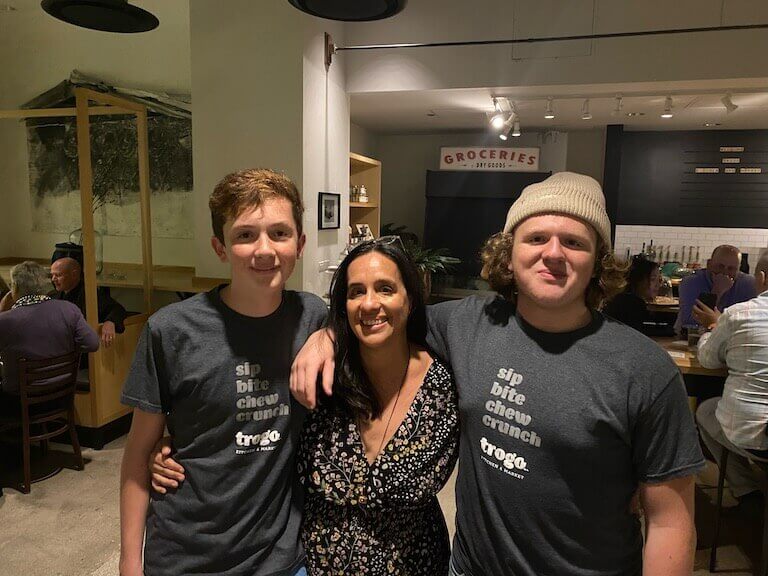Listen to This Article:
Lolita Sereleas has cooked a lot of Greek meals in her life. A first-generation American raised on Greek food who spent summers on the outskirts of Athens as a child, she knows her spanakopita. And when Lolita looked at a spanakopita recipe during a plant-based world cuisine class at Escoffier, she had her doubts.
“I looked at this recipe,” she said during a recent interview, “and said, ‘Oh my goodness, my yiayia is turning over in her grave. There’s tofu!'”
Skeptical of the ingredients and of her late grandmother’s reaction, Lolita soldiered on with the tofu, and a funny thing happened.
“It is the most delicious thing I have ever tasted.”
Moments like that were exactly what she had hoped for when Lolita enrolled in the online Plant-Based Culinary Arts program at Auguste Escoffier School of Culinary Arts. She had long loved cooking but never considered a career in it. But when the pandemic hit, Lolita’s latent dream reawakened when she found herself with a little extra time and a lot of extra vegetables.
Steaming Hot Goat’s Milk and Olive Groves
Lolita grew up in the south suburbs of Chicago where, despite the proximity to a major metropolis, many of her friends didn’t venture to the city until their junior or senior years of high school—and never mind traveling abroad.
As for Lolita’s family, they’d spend two months every summer in Greece on the coast outside of Athens. The beaches in Greece were filled with tourists, and Lolita played with kids from around the world.
“Summers in Greece also gave me some of my strongest food memories,” she said. “Tomatoes that tasted nothing like the bland tomatoes in the U.S., so many fruits, and out-of-this-world vegetable dishes. And of course, fresh seafood.”

Lolita Sereleas’ cooking is inspired by her Greek heritage and her many visits to Greece growing up. Here, she stands in an olive grove outside their family village in Greece.
Lolita remembers ladies from the village showing up at the door with steaming hot goat’s milk, and her father looking at her with a “You’ve gotta drink this” look. She was grossed out by the goat’s milk but loved the homemade cheeses, the olives the locals would harvest, and the olive oil. Everyone in Greece would grow their own food — including tomatoes — and had one or two goats.
“I’ll never forget tasting a tomato the first time, how sweet and full of a sugar taste it was,” she said. “And then coming back, in the ’70s and ’80s, grocery store tomatoes tasted like cardboard.”
Lolita cooked with her dad, her grandmother, and her mom. Lolita’s given name is Theodora; her grandmother’s nickname was Lola, and Lolita is “little Lola.” But despite her love of cooking and the strong influences from southern Greece, she never considered a culinary career.
“I just never thought of it as a career option,” she said. “I don’t know why; cooking was just something that we did. Like, we’re Greeks. We feed people all the time.”
Instead, Lolita got a Master’s Degree in Public Service Management with a concentration in Urban Planning, and she started a boutique consulting firm focused on community development finance. The company, FUND Consulting, which she founded with a close friend, focuses on economic justice and healthy food financing. Over the next 20 years, they grew the business to include about 25 people, and Lolita remained an entrepreneur who loved to cook as a hobby.
An Abundance of Veggies, and an Opportunity
In 2020, Lolita’s husband, Cian O’Mahoney, began developing a new business idea during the pandemic—specifically, a delivery business. With a background in sustainable food systems, he built an online farmer’s market, coordinating with local farmers to deliver produce.
He grew the business to the point where he needed an office and happened upon the Green Exchange building, not far from Wrigley Field and the southern shore of Lake Michigan. The building, a sustainable mixed-use space, included a defunct urban farm.
“So we were kind of given a farm,” Lolita said.
As Cian built the business, he brought home a lot of veggies, and Lolita saw an opportunity.
She had been cutting back on meat already, influenced by her father’s stroke a few years earlier and her own challenges with Metabolic Syndrome. “It’s super easy to make meat and cheese taste good, and there’s a lot of really crappy vegan food out there.”
An avid diner, Lolita had also heard from friends that her food was just as delicious as anything they ate when they went out.
“I would get a lot of feedback,” she said. “Like, this food is amazing, but you know, yours is as good as this. I was like, Is it? Well, maybe I should give it a shot.”
A Deep Dive Into Traditional Greek Dishes
Lolita enrolled at Escoffier because it was the only plant-based program she could find that was so deeply focused on the foundations of plant-based cooking. She talked to vegan and vegetarian friends as she researched plant-based diets, and she set out to find out more about how to adapt some of her beloved Greek dishes.
“My background is Greek, and so most people think of Greek, and they think of gyros and lamb.” … but the traditional food, she said, is beautiful stewed vegetables and salads and pies. “So I really wanted to take a deep dive into that. So as [Cian] was growing that business around vegetables, I was learning more about vegetables at Escoffier.”
In fact, this approach aligned really well with her cultural heritage. Although Lolita would adapt dishes like spanakopita or moussaka—a lasagna-style dish with eggplant, ground meat, and a béchamel sauce—she really focused on vegetables.
“I wish more people knew that most traditional Greek foods are plant-based—veggies stewed in tomato and olive oil, satisfying beans, and more,” she said.
Lolita found that many vegan offerings in the grocery store and at restaurants were highly processed. She appreciated Escoffier’s focus on whole food substitutes instead of overly-processed options, and on applying classic principles to plant-based dishes.
She also appreciated how many new skills she picked up.
“There was a lot of work, and I could see the skill development, even for someone who knew how to cook, just for the technique and the chopping and the knife cuts. And like, understanding you always maybe knew how to cook, but not why you were doing some of the things you were doing. And it was pretty amazing.”
As for the tweaks she made, Lolita found many uses for ingredients like tofu, jackfruit, and mushrooms. She said diners have told her they prefer her gyros made with mushrooms over the meat version. And she figured out how to make spanakopita without dairy cheese.
“The amazing chef instructors came up with this magical combination,” she said. “It’s firm tofu, nutritional yeast, ground almonds, lemon, and salt mixed all together with the traditional ingredients, and then olive oil. And, of course, I always tweak things. I put way more olive oil than any instructor would ever tell me.”
On May 2, 2023, Lolita and Cian opened Trogo Kitchen & Market. The process was “an absolute rollercoaster,” Lolita said, full of starts and stops as well as challenges related to staffing. But they made it work.
Making Vegetables Sing
Trogo is located on the second floor of an office building whose claim to fame is that the pilot episode of The Bear was filmed in its kitchen.
Trogo, which means “to eat, nibble, chew,” in Greek, is a three-pronged business: it’s primarily private dining and catering but the business also does pop-ups. In addition to the dining area on the second floor, there are 24 seats at the urban farm downstairs.

Scenes from a Trogo popup, which have attracted top-notch chefs. Photo credit Jessica Mlinaric.
Although catering is the mainstay of the business, Lolita said the pop-ups are probably the most fun. And she takes pride in converting meat-eaters into diners who appreciate a vegan meal—and she jokes that Trogo is “sneaky” about it. For example, that spanakopita? She doesn’t make a big deal about it being vegan.
“We’ll put the little ‘v’ for vegan (on the menu) but we don’t say ‘vegan spanakopita.’ We’ll say ‘spanakopita,’ because it is a delicious spinach pie. That is what it is,” she said. “And they’re like, ‘No bleeping way that there isn’t cheese in here!’” she said. “I’m like, ‘Nope.’ It’s pretty amazing.”
At the same time, she doesn’t try to make vegan food taste like something it isn’t.
“I think the one thing that I also liked about this program, and I think also what defines me as a plant-based chef, is I don’t try to make things taste like meat or taste like cheese,” she said. “I want people to see that vegetables are freaking delicious, and you don’t have to add bacon or cheese to vegetables to make them delicious either.”
Future: More Collaboration, More Fun
Lolita still does consulting in addition to Trogo and raising two teenage boys. At Trogo, she heads up the catering and develops the menus.
She’d like to continue the business and attract more chefs for a variety of pop-ups. Among other publications, they’ve been featured in Eater Chicago’s list of best pop-up restaurants and in TimeOut Chicago. And Lolita has done recipe demonstrations on the local news.
“We kind of call it a place where chefs come to play, because we have one here who’s testing out his next concept, and it’s just really fun and creative and collaborative,” she said.

Lolita Sereleas and her two sons during a popup event at Trogo.
Lolita said she’s grateful for her experience at Escoffier.
“I just want to underscore what a really transformative experience Escoffier was,” she said. “I will always be indebted and find ways to give back. And it just led me down a path that I never thought I would actually (pursue) in a practical way, and I’m just really loving it.”
Is It Time To Act Upon Your Dream?
Lolita never imagined the ways she could transform traditional Greek dishes into plant-based meals, nor did she anticipate turning her lifelong passion for cooking into a thriving business. But when the opportunity presented itself, she jumped at the chance.
Maybe Escoffer’s plant-based program appeals to you as well, or you’ve wondered about pursuing another career in the culinary arts. Escoffier has campuses in Boulder, Colorado, and in Austin, Texas, as well as online courses.
If you’ve wondered whether you could turn your culinary passion or interest into a career, contact us to find out more.
CHECK OUT MORE INSPIRING STUDENT SUCCESS STORIES HERE:
- From Desk Job to Pitmaster: A Culinary Journey with Escoffier Graduate Michael Fields
- How Chef Instructor Steven Nalls Built a Sustainable Farm-to-Table Lifestyle
- The Unlikely Leap: How an Injury Transformed a Ballet Dancer into a Culinary Artist
*Information may not reflect every student’s experience. Results and outcomes may be based on several factors, such as geographical region or previous experience.

